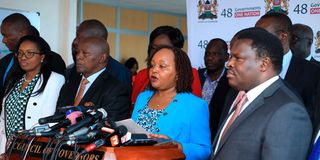CRA advises governors to digitise revenue streams

Council of Governors chairperson Ann Waiguru addresses journalists at Delta Corner building in Nairobi on October 6, 2022. County governments have been urged to automate and define their revenue streams in order to reduce reliance on the exchequer.
What you need to know:
- The call comes when the 47 devolved governments are grappling with the delayed release of funds by the National Treasury.
- The Commission on Revenue Allocation (CRA) says devolved governments have not fully exploited their own source revenue potential. They collect a paltry 16 per cent of the potential.
- Mr Muriithi said county governments can improve the collection by updating their billing systems to net close to half of the property owners who don’t pay taxes.
County governments have been urged to automate and define their revenue streams in order to reduce reliance on the exchequer.
The call comes when the 47 devolved governments are grappling with the delayed release of funds by the National Treasury, a situation that threatens to paralyse operations and services.
The arrears have accumulated to more than Sh51 billion.
The Commission on Revenue Allocation (CRA) says devolved governments have not fully exploited their own source revenue potential. They collect a paltry 16 per cent of the potential.
Dr Irene Asienga, a commissioner with CRA, said counties collect Sh33.9 billion against a target of Sh52.8 billion annually.
“However, the county governments’ potential is Sh216 billion,” she told the Daily Nation by phone yesterday.
“The huge gap can only be bridged by automating revenue management, improving revenue management efficiency, pushing for a unified revenue management system and updating valuation rolls.”
She added that the CRA has prioritised six revenue streams that counties should define to enhance the collection.
They are property rates, single business permits, parking fees, outdoor advertising, transport and hospital and public health fees.
Property lists
“These can raise close to Sh160 billion,” she said.
Dr Asienga said updating the valuation roll would more than double the rate collection from the current 36 per cent.
“Updating property lists can generate Sh23 billion, outdoor advertising fees Sh81 billion while hospital and public health fees can bring in Sh33 billion,” she said.
“Parking fee collection is at 48 per cent, showing there are leakages.”
Former Laikipia Governor Ndiritu Muriithi agreed with Dr Asienga, saying, county governments should explore other ways of growing their collections.
He said they need to embrace technology by going cashless in an effort to seal loopholes that come with handling cash.
Mr Muriithi said county governments can improve the collection by updating their billing systems to net close to half of the property owners who don’t pay taxes.
“Devolved units should invoice the national government to pay property tax,” he said.
According to Mr Muriithi, counties can exploit land value capture by taxing the incremental value of the property at the transaction point.
“We raised our own source revenue in Laikipia from Sh400 million to Sh1 billion when I was governor. But this is just 40 per cent of the country's potential,” he said.
Mr Muriithi added that counties should consider capital markets by issuing securities, citing the Sh1.16 billion Laikipia Infrastructure Bond.
The project that’s to go to the market focuses on infrastructure and water services. It touts ‘smart’ towns by improving parking, sewer and water connections to attract more businesses.
“We realised that improving towns more than doubled investments. The number of traders applying for permits almost tripled from 500 to 1,430 in just two years,” he said.
CRA has been encouraging borrowing by coming up with counties' creditworthiness checklist, Dr Asienga said.





